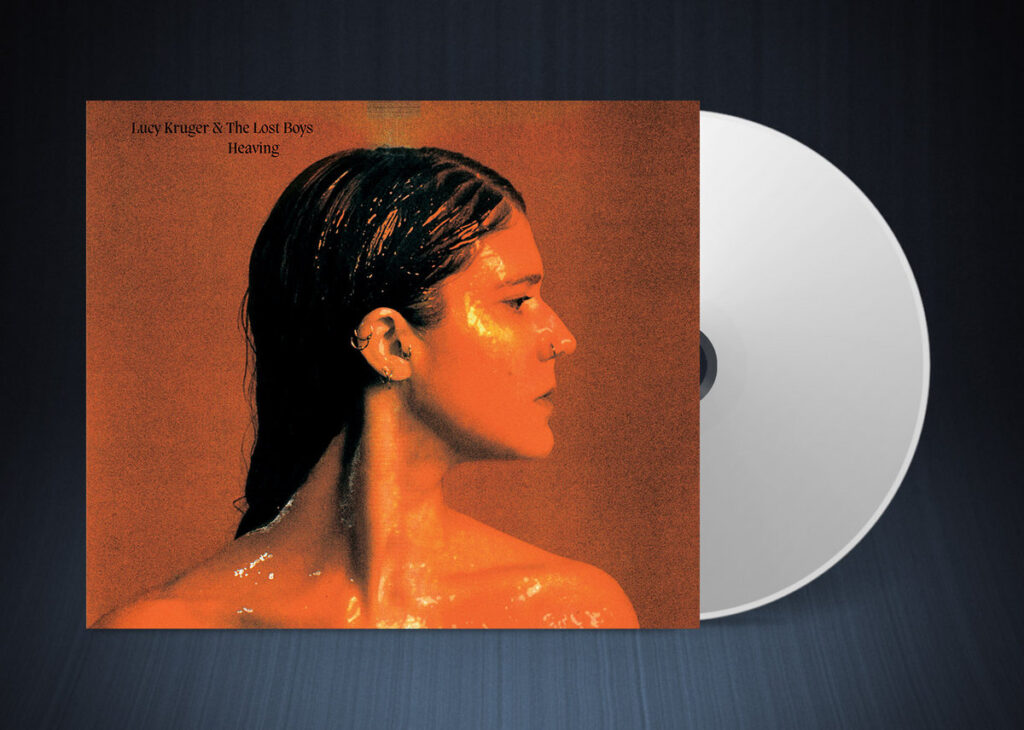
The Berlin-based Lucy Kruger & The Lost Boys serve up a merger of moody indie art pop and delightful ambient noise. The group, fronted by South African-born artist Lucy Kruger, has just released “Heaving,” a vivid, visceral, and unbounded exploration of sonic storytelling. Lucy recently stated, “I think that what I am able to offer as an artist is a detailed expression of my experience, for although the situation may feel unique to me, the feelings are universal. Giving them a sound and shape validates and creates space for those feelings, allowing listeners to feel seen, even at a distance. Even in the isolation of a bedroom. Especially in the isolation of a bedroom.” Today, Metropolis Records releases “Heaving” on limited edition vinyl and compact disc as well as through all digital and streaming platforms.
Lucy Kruger & The Lost Boys – Heaving (Official Music Video):
https://www.lucykrugerandthelostboys.com/
https://lucykruger.bandcamp.com/album/heaving
Heaving, the first musical departure from Lucy Kruger & The Lost Boys’ recent tape series, is a vivid, visceral and unbounded exploration of sonic storytelling.
Relying on the idea articulated by poet and essayist Anne Carson that “every sound we make is a bit of autobiography. It has a totally private interior yet its trajectory is public. A piece of inside projected to the outside”, Kruger dove into the composition process through performance, rather than with the pen. The album offered the artist, and hopes to offer the audience, a coming home to the body through a physical relationship to sound.
“With this new album, I wanted to reach a sub layer of my skin, and of the song,” she reveals. “To get closer to the sound, effort and energy of the pulse that pushes and pulls me, both violently and tenderly. To draw something out, mostly through the use of my voice, which in the moment of experimenting and writing, I understood to be a part of my body, myself, being offered up, without knowing how that offering would present itself. To invite strangeness. To risk oozing and excess. Or the opposite.”
Through this process, Kruger didn’t want as much to relay something, but instead discover – and then precisely transmit – what is there. “There is something about the physical act of singing and shaping sounds that allows one to transcend the usual cerebral boundaries of the written or conventionally spoken word,” she explains.
“Melody, rhythm and rhyme have the capacity to carry one into a more intuitive state, in which words and phrases are less bound by pre-conceived concepts.”
On her sixth record, Kruger very specifically uses the pulses, the judders, the throbbing, and the echoes afforded by electronic elements (sometimes also created by the voice) to entrance the body, while the lyrics confront and converse in a more explicit way – trying to merge and experiment with different forms of feeling and processing. “I wanted to speak directly to big, scary and seductive ideas and experiences. Around desire, fear of death, damage, disintegration, deep love – its opposite, if there is – and its accompanying loneliness.”
The musicians who join Kruger, and carve out the detailed and idiosyncratic landscape of sound on the record, are Liú Mottes (guitar, bass synthesiser, bass guitar, piano), Martin Perret (drums), Jean-Louise Parker (violin, voice), Calvin Siderfin (bass), Andreas Miranda (bass), Gidon Carmel (drums) and André Leo (guitar). All of the musicians have been involved in the various formations of The Lost Boys over the years and have played an integral role in shaping the dynamic sound the band have developed over time, both live and in studio.
This album encapsulates that full spectrum of sound, and one of the striking aspects of Heaving is the changeability in its 10 songs. “Burning Building” thrives in sudden shifts of tone and volume and vocal phrasing that turn this short, spiky track into a post-punk anthem for the time, and then, just two songs later, “Front Row” takes its time, slowly unwinding a story of desire on the back of muted percussion, eerie guitars, full throated bass, and near hymnal-backing vocals.
Although lyrically it draws on deeply personal experiences, Heaving also has flashes of humour that veils or highlights truths – a playfulness that subverts and invites honesty.
Kruger wanted to expand, stretch and dramatise her approach to songwriting on this album – to push her voice and performance until something new appeared. Once she’d found the seed of something worth exploring, she and the band would start introducing instrumentation to the skeleton of beat and lyrics. The addition of violas, guitars, drums, bass and piano would complicate the meaning and bring out different readings and feelings.
The title track for the album, heaving – a word that recurs throughout the 10 songs – carries with it both the effort and inevitability involved in the process, and in the themes Kruger was exploring. A crowded room of sweating bodies heaves; there is the heaving of her chest; the strata heaves with the faulting of a rock; the way she heaves a sigh of relief. It is a visceral and physical experience.
“I wanted this album to be less ethereal somehow. Rooted in the depths, of my body, of my lover’s body, of the earth, where it is dark and wet, and where you might find rot but you will also certainly find life. To somehow get pulled into the moment, through a focus on sensation. A lot of the lyrics deal with touch, smell, taste. The body, and all it holds, imagined intimately, almost as landscape, but also for what it is. And for what will happen to it in time. A reckoning with death and loss that might allow for a more vibrant understanding and engagement with life.”